- Clone
- m1B9 (See other available formats)
- Regulatory Status
- RUO
- Other Names
- SR-BI, SRB1, SR-B1, SRBI, CLA-1, CLA1, HDLQTL6
- Isotype
- Mouse IgG1, κ
- Ave. Rating
- Submit a Review
- Product Citations
- publications
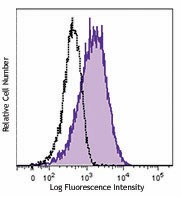
-

Human monocyte-derived dendritic cells were stained with purified anti-human CD36L1 (clone m1B9, filled histogram) or purified mouse IgG1, κ isotype control (open histogram), followed by anti-mouse IgG PE.
| Cat # | Size | Price | Quantity Check Availability | Save | ||
|---|---|---|---|---|---|---|
| 363201 | 100 µg | £230 | ||||
Scavenger receptor class B type I (SCARB1), also known as CD36L1, is an integral membrane protein found in numerous cell types and tissues that is mainly expressed in the liver and the adrenal glands. Its primary function is facilitating the uptake of cholesteryl esters from high-density lipoproteins (HDL) due to its high affinity to HDL. This function serves to lower the risk of development of atherosclerosis. SCARB1 is also able to bind to other lipoproteins such as LDL, OxLDL, and VLDL. SCARB1 is also likely to be involved in pathogen recognition through its recognition of mycobacteria and other viral proteins and regulates vitamin E levels in the tissue.
Product DetailsProduct Details
- Verified Reactivity
- Human
- Antibody Type
- Monoclonal
- Host Species
- Mouse
- Formulation
- Phosphate-buffered solution, pH 7.2, containing 0.09% sodium azide.
- Preparation
- The antibody was purified by affinity chromatography.
- Concentration
- 0.5 mg/ml
- Storage & Handling
- The antibody solution should be stored undiluted between 2°C and 8°C.
- Application
-
FC - Quality tested
- Recommended Usage
-
Each lot of this antibody is quality control tested by immunofluorescent staining with flow cytometric analysis. For flow cytometric staining, the suggested use of this reagent is ≤0.5 µg per million cells in 100 µl volume. It is recommended that the reagent be titrated for optimal performance for each application.
- Product Citations
-
- RRID
-
AB_2564121 (BioLegend Cat. No. 363201)
Antigen Details
- Structure
- Integral membrane glycoprotein.
- Distribution
-
Macrophages, hepatocytes, dendritic cells, adrenocortical cells, adipocytes, trophoblastic cells.
- Function
- Involved in the uptake of high density lipoproteins (HDL), phagocytosis of apoptotic cells, and pathogen recognition. Receptor target of the hepatitis C virus.
- Ligand/Receptor
- Phosphatidylserine, HDL, apoB-containing lipoproteins, LDL, vitamin E.
- Cell Type
- Macrophages, Dendritic cells
- Biology Area
- Cell Adhesion, Cell Biology, Immunology
- Molecular Family
- Adhesion Molecules, CD Molecules
- Antigen References
-
1. Acton S, et al. 1996. Science. 5248:518.
2. Rigotti A, et al. 2003. Endocr. Rev. 24:357.
3. Valacchi G, et al. 2011. Ann. N. Y. Acad. Sci. 1229:E1.
4. Scarselli E, et al. 2002. EMBO J. 21:5017.
5. Mardones P, et al. 2002. J. Nutr. 132:443. - Gene ID
- 949 View all products for this Gene ID
- UniProt
- View information about CD36L1 on UniProt.org
Related Pages & Pathways
Pages
Related FAQs
Other Formats
View All CD36L1 Reagents Request Custom Conjugation| Description | Clone | Applications |
|---|---|---|
| Purified anti-human CD36L1 (SCARB1, SR-BI) | m1B9 | FC |
| PE anti-human CD36L1 (SCARB1, SR-BI) | m1B9 | FC |
| PerCP/Cyanine5.5 anti-human CD36L1 (SCARB1, SR-BI) | m1B9 | FC |
| APC anti-human CD36L1 (SCARB1, SR-BI) | m1B9 | FC |
| PE/Cyanine7 anti-human CD36L1 (SCARB1, SR-BI) | m1B9 | FC |
Compare Data Across All Formats
This data display is provided for general comparisons between formats.
Your actual data may vary due to variations in samples, target cells, instruments and their settings, staining conditions, and other factors.
If you need assistance with selecting the best format contact our expert technical support team.
-
Purified anti-human CD36L1 (SCARB1, SR-BI)
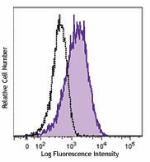
Human monocyte-derived dendritic cells were stained with pur... -
PE anti-human CD36L1 (SCARB1, SR-BI)
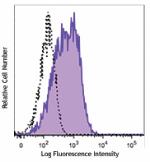
Human monocyte-derived dendritic cells were stained with CD3... -
PerCP/Cyanine5.5 anti-human CD36L1 (SCARB1, SR-BI)
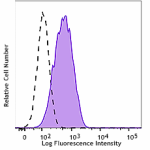
Human monocyte-derived dendritic cells were stained with CD3... -
APC anti-human CD36L1 (SCARB1, SR-BI)
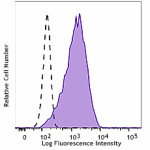
Human monocyte-derived dendritic cells were stained with CD3... -
PE/Cyanine7 anti-human CD36L1 (SCARB1, SR-BI)
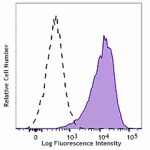
Human monocyte-derived dendritic cells were stained with CD3...
 Login / Register
Login / Register 








Follow Us